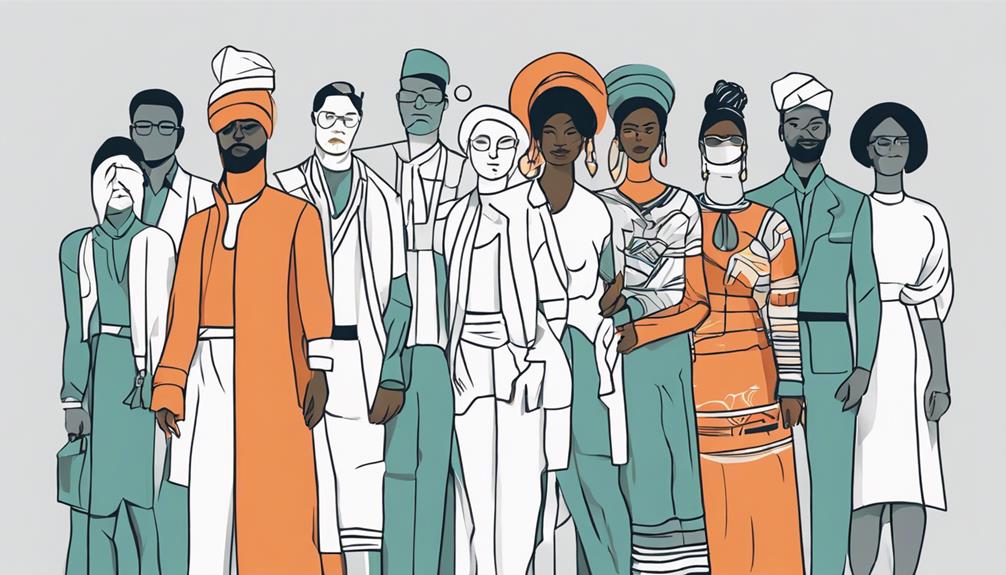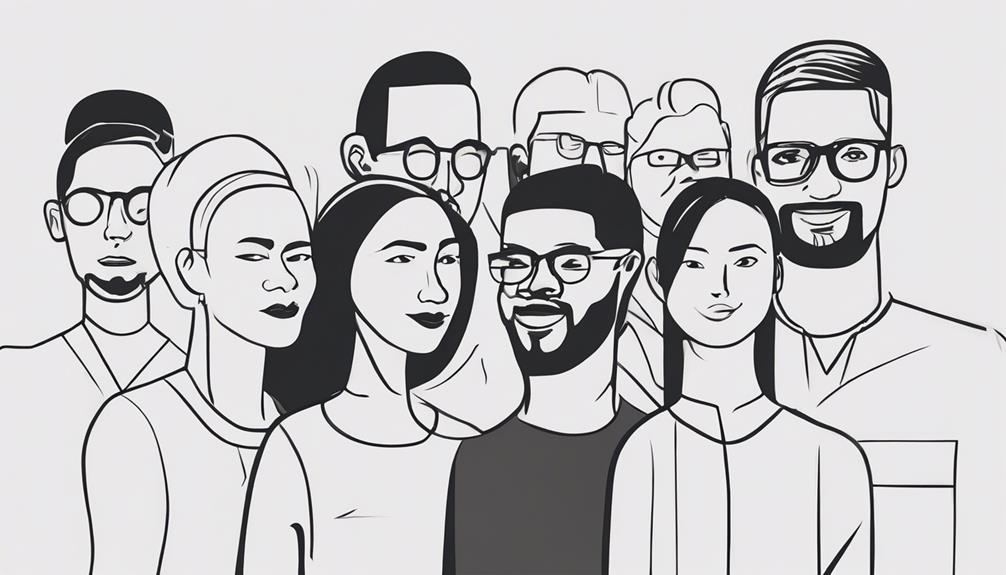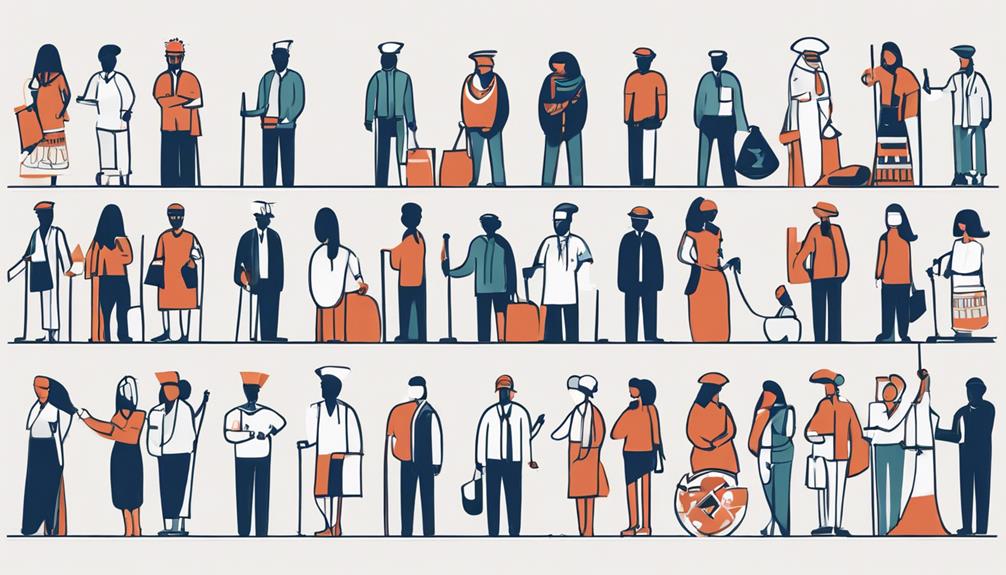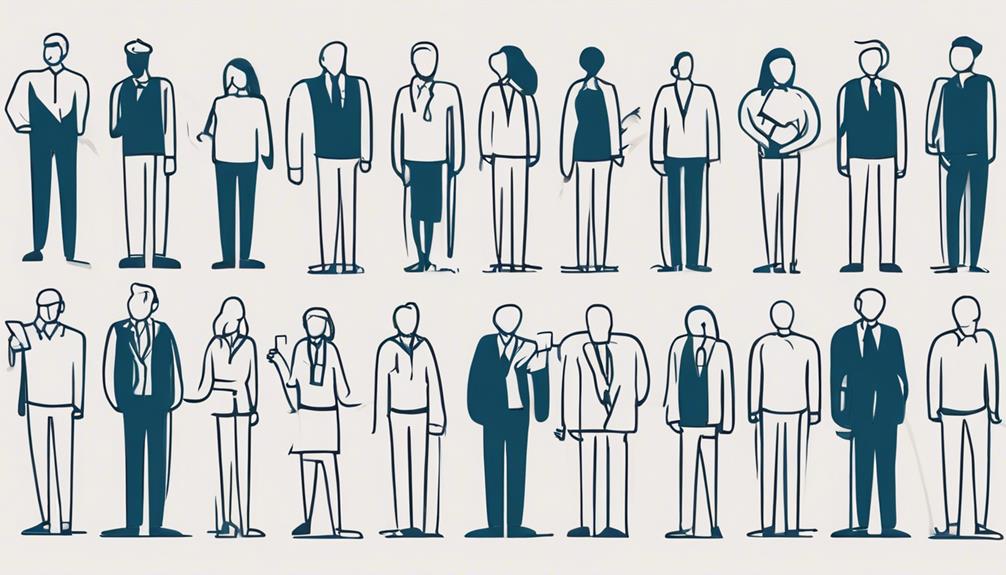Effective leadership is a multifaceted concept that requires a blend of qualities to inspire and drive teams towards achieving common goals. As organizations evolve and face diverse challenges, the role of a leader becomes increasingly complex. From communication skills to adaptability, the traits that define a good leader are crucial for organizational success. By exploring various leadership qualities and their impact across different cultures and societies, we can gain a deeper understanding of what truly makes a leader effective in today's dynamic global landscape.
Key Takeaways
- Cultural intelligence is essential for effective leadership.
- Trust, communication, and inclusivity are foundational for good leadership.
- Diversity enhances innovation and creativity in organizations.
- Adapting leadership styles to cultural values drives success.
Leadership Qualities in Different Societies

Different societies around the world prioritize distinct leadership qualities that reflect their cultural values and norms. For instance, in Japan, leaders are highly esteemed when they exhibit humility, harmony, and consensus-building skills. This reflects the cultural value placed on modesty and group cohesion. Scandinavian countries, on the other hand, emphasize egalitarianism, transparency, and inclusivity in their leaders, mirroring their societal emphasis on equality and openness.
In African cultures, communal leadership is often highlighted, with leaders focusing on community well-being and consensus rather than individual achievements. This underscores the collective nature of many African societies where the community's welfare takes precedence over personal interests. In the Middle East, strong communication skills, respect for hierarchy, and relationship-building are valued in leaders, reflecting the importance placed on clear communication, traditional structures, and interpersonal connections in the region.
These examples demonstrate how leadership styles vary across different cultures, showcasing how cultural values shape the qualities and attributes that are valued in leaders worldwide.
Essential Attributes of a Leader
Leadership excellence hinges on possessing a set of essential attributes that encompass self-awareness, trust-building, compassionate guidance, clear communication, and a commitment to learning and collaboration. To further elaborate on the essential qualities of a leader:
- Self-Awareness: Good leaders exhibit self-awareness by understanding their strengths and weaknesses, allowing them to leverage their skills effectively and seek support where needed.
- Trust-Building: Effective leaders prioritize building trust and respect within their teams, fostering an environment where individuals feel secure and empowered to contribute their best.
- Compassionate Guidance: Compassionate leadership helps reduce turnover and build strong relationships by showing empathy, understanding, and support for team members.
- Clear Communication: Motivating with a clear vision and effective communication skills are essential leadership traits that ensure alignment, reduce misunderstandings, and inspire action among team members.
These essential leadership qualities are foundational for leaders striving to create high-performing teams, foster innovation, and achieve lasting success through collaborative efforts.
Cultural Influences on Leadership Traits

Cultural influences play a significant role in shaping leadership traits worldwide. Understanding how different cultures value and perceive leadership qualities is essential for effective leadership in diverse environments. Leaders must adapt their approaches to accommodate varying cultural norms and foster inclusivity within their teams.
Cultural Impact on Leadership
Understanding the diverse influences that shape leadership traits is essential for effective cross-cultural leadership. Cultural influences play a significant role in determining leadership styles, impacting communication methods, decision-making processes, and overall team dynamics. Here are key points to consider:
- Communication Styles: Different cultures have varying approaches to communication, influencing how leaders interact with their teams and convey their vision.
- Decision-Making Processes: Cultural values and norms affect how leaders make decisions, whether through consensus-building or authoritative directives.
- Leadership Qualities: Various cultures prioritize different leadership qualities, such as assertiveness, humility, or emotional intelligence.
- Team Dynamics: Cultural diversity within leadership teams can lead to innovative problem-solving strategies and foster a broader range of perspectives.
Diversity in Leadership
In exploring the impact of cultural influences on leadership traits, it becomes evident that diversity in leadership is a multifaceted aspect that significantly shapes organizational dynamics and decision-making processes. Cultural influences play a crucial role in determining leadership styles and behaviors, with different cultures emphasizing specific qualities like collectivism, hierarchy, or individualism. The presence of cultural diversity in leadership brings a wide range of perspectives and problem-solving approaches to the table, enhancing innovation and creativity within organizations. Effective leadership in a diverse global environment necessitates a deep understanding of cultural nuances to foster collaboration and harmony. Leaders equipped with cultural intelligence (CQ) possess the skills needed to navigate and leverage the strengths of diverse teams, ultimately driving success in today's interconnected world.
Global Leadership Traits
How do cultural influences shape global leadership traits and impact the effectiveness of leaders on a worldwide scale? Cultural intelligence plays a pivotal role in understanding and embodying effective leadership qualities across diverse cultures. Here are four key points to consider:
- Adaptability: Effective leaders adjust their leadership style to align with cultural preferences and norms, fostering better communication and collaboration.
- Empathy: Understanding and empathizing with diverse perspectives enables leaders to build trust and rapport within multicultural teams.
- Respect for Hierarchy: Some cultures value hierarchical structures, requiring leaders to demonstrate respect for authority and establish clear lines of communication.
- Promotion of Egalitarianism: In contrast, leaders in egalitarian cultures focus on equality and inclusivity, fostering a sense of unity and teamwork among team members.
Global Perspectives on Leadership Skills

Global leaders demonstrate a commitment to continual learning and development as they enhance their leadership skills on a global scale. In today's interconnected world, having a global perspective is crucial for effective leadership. Online leadership training can greatly aid leaders in developing the necessary skills to navigate diverse cultural landscapes and international business environments. Communication skills play a vital role in bridging cultural gaps and fostering collaboration among team members from different backgrounds. Successful leaders understand the importance of empathy and emotional intelligence in cross-cultural interactions, enabling them to build strong relationships and inspire trust globally. Embracing diversity and inclusivity is key for leaders with a global mindset, as it drives innovation and success in international settings. By investing in their development and honing these essential skills, leaders can effectively lead diverse teams and navigate the complexities of the global marketplace.
Universal Traits of Effective Leaders
Drawing on the foundation of global perspectives on leadership skills, the universal traits of effective leaders encompass essential qualities that transcend cultural boundaries and are fundamental to achieving success in diverse environments. When examining the qualities of a good leader, certain key traits consistently emerge:
- Self-Awareness and Humility: Effective leaders demonstrate a deep understanding of themselves and remain humble, inspiring trust and respect within their teams.
- Continuous Learning and Growth: Good leaders prioritize ongoing development to adapt to new challenges and enhance their leadership skills, staying ahead in an ever-changing landscape.
- Compassion, Integrity, and Gratitude: Successful leaders exhibit empathy, honesty, and appreciation, creating a positive work environment that supports employee well-being.
- Strong Communication, Vision, and Motivation: Leaders with strong communication skills, a clear vision, and the ability to motivate with purpose are better equipped to guide their teams towards success.
These universal traits form the backbone of effective leadership, guiding individuals to become impactful and respected leaders regardless of cultural differences.
Societal Factors Shaping Leadership Qualities

Societal factors play a crucial role in shaping the qualities required of effective leaders. Cultural influences and economic impacts are key aspects that influence leadership styles in a rapidly evolving global landscape. Understanding how these societal factors affect leadership is essential for leaders aiming to navigate the complexities of modern organizational environments.
Cultural Influences on Leadership
Cultural influences play a pivotal role in shaping leadership qualities by molding leadership styles, behaviors, and decision-making processes. Understanding these influences is crucial for effective leadership in diverse environments. Here are four key ways in which cultural influences impact leadership:
- Norms and Values: Societal norms and values dictate acceptable leadership behaviors.
- Trait Prioritization: Different cultures prioritize specific leadership traits such as collectivism or individualism.
- Approaches Towards Hierarchy: National cultures influence attitudes towards hierarchy in leadership roles.
- Communication Styles: Cultural backgrounds shape communication and conflict resolution approaches within leadership contexts.
Economic Impact on Leadership
Leadership qualities are significantly influenced by the economic factors at play within a societal framework. The economic impact on leadership is profound, as poor leadership can lead to reduced productivity, increased turnover, and decreased job satisfaction. Bad leadership can result in up to a 7% decrease in team productivity, with employees being 63% more likely to consider leaving their job under ineffective management. Additionally, burned-out employees, a common outcome of bad leadership, are 23% more likely to seek medical attention. In contrast, effective leaders gain the trust and loyalty of their team members by fostering a positive work environment, promoting productivity, and boosting morale. Traits such as adaptability, financial acumen, and strategic decision-making can help leaders navigate economic challenges successfully.
Diverse Leadership Characteristics
Diverse leadership characteristics play a crucial role in shaping the effectiveness and success of individuals in leadership roles. Good leaders exhibit a wide range of qualities that contribute to their ability to guide and inspire others. These qualities include:
- Self-awareness: Good leaders have a deep understanding of their strengths, weaknesses, and values, allowing them to lead with authenticity and humility.
- Empathy: Effective leaders demonstrate empathy towards their team members, understanding their perspectives and emotions to build strong relationships based on trust and collaboration.
- Decisiveness: Leaders who can make tough decisions with confidence and clarity inspire trust and respect from their team, driving progress and achieving goals.
- Continuous learning: Successful leaders prioritize personal and professional growth, showing adaptability and resilience in the face of challenges while cultivating a culture of innovation and development within their teams.
Impact of Cultural Norms on Leadership

Cultural norms play a significant role in shaping leadership practices and expectations within organizations. These norms can influence the emphasis placed on certain leadership traits, impacting the effectiveness of leadership styles. Leaders need to be culturally aware and adaptable to effectively lead diverse teams in varying cultural contexts.
Cultural Influence on Leadership
In the realm of effective leadership, the influence of cultural norms on leadership styles and approaches cannot be underestimated. Leaders who understand the impact of cultural influence on organizational behavior can navigate diverse environments more successfully. Here are some key points to consider:
- Adaptation: Leaders need to know how to adapt their leadership style to align with cultural expectations and values.
- Communication: Cultural influence on leadership can significantly impact communication within a team or organization.
- Decision-making: Cultural norms can shape decision-making processes, affecting the speed and style of choices made.
- Team dynamics: Understanding cultural nuances is essential for managing and enhancing team dynamics for optimal performance.
Diversity in Leadership
Within the realm of leadership, the impact of varying cultural norms on leadership strategies and practices is a crucial factor to consider for fostering inclusive and effective teams. Cultural norms can significantly influence leadership styles, communication methods, decision-making processes, and conflict resolution approaches within organizations. Different cultures prioritize distinct leadership traits, which can impact the overall effectiveness of leadership within diverse teams. Understanding and embracing diversity in leadership can lead to more inclusive and successful teams by leveraging the strengths of various cultural perspectives. By incorporating a range of cultural norms into leadership practices, organizations can drive innovation, creativity, and collaboration, ultimately enhancing their performance and adaptability in a globalized world.
| Leadership Diversity | Cultural Norms | Inclusive Teams |
|---|---|---|
| Varied leadership styles | Influences on traits | Leveraging strengths |
| Communication impact | Decision-making differences | Fostering collaboration |
| Conflict resolution methods | Prioritized leadership traits | Enhancing performance |
Leadership Traits Across Cultures
Effective leaders demonstrate a keen awareness of how leadership traits can vary significantly across different cultural contexts. Cultural background plays a pivotal role in shaping leadership styles, communication patterns, and decision-making processes. To navigate cross-cultural leadership challenges successfully, leaders must possess cultural intelligence, allowing them to adapt their approach to align with the cultural context they operate in. Harvard Business Publishing emphasizes the importance of understanding cultural differences for effective leadership in diverse environments. Here are four key points to consider when discussing leadership traits across cultures:
- Societal Norms and Values: Different cultures have unique societal norms and values that influence leadership traits.
- Communication Patterns: Cultural backgrounds can impact how individuals communicate within a leadership setting.
- Decision-Making Processes: Cultural differences can lead to varying approaches to decision-making within leadership roles.
- Adaptability: Successful leaders demonstrate adaptability by adjusting their leadership style to fit the cultural context they are working in.
Effective Leadership Qualities Worldwide

Leaders across diverse cultural backgrounds universally embody essential qualities that define effective leadership on a global scale. Good leaders bring together a mix of self-awareness, humility, and strong communication skills. They prioritize respect, inclusivity, and the establishment of trust within their teams. Compassionate leadership, a compelling vision, and clear communication are key attributes that successful leaders worldwide possess. Learning agility, collaboration, and integrity are vital components that contribute to leadership effectiveness on an international level. Furthermore, courage, gratitude, and a commitment to continuous learning are essential aspects of great leadership, transcending various cultures and regions. By honing these essential leadership qualities, individuals can enhance their skills with courses and training programs that focus on developing these core competencies. Effective leaders understand the significance of these qualities in fostering a positive work environment and driving success on a global scale.
Frequently Asked Questions
What Are the 5 Qualities of a Good Leader?
Effective leaders possess a blend of qualities that set them apart. Key attributes include effective communication and decision-making skills, empathy, and integrity. These leaders also exhibit strategic vision and adaptability in navigating complex challenges. By embodying these qualities, leaders can inspire trust, foster collaboration, and drive organizational success. Each trait plays a pivotal role in shaping a leader's ability to guide their team towards shared goals and objectives.
What Are the 3 Most Important Qualities of a Great Leader?
Emotional intelligence, communication skills, integrity, empathy, and vision, decisiveness are central to effective leadership. The ability to understand and manage emotions, communicate effectively, demonstrate integrity and empathy, and inspire others with a clear vision while making decisive decisions are critical qualities in great leaders. These attributes create a foundation for building strong relationships, fostering trust, and driving team success. Leaders who embody these qualities are well-positioned to navigate challenges and achieve sustainable results.
What Are the 7 Leadership Qualities of Great Leaders?
Effective leaders possess a myriad of qualities that set them apart. They excel in effective communication and decision-making, inspiring and motivating others with strategic thinking. Additionally, they demonstrate empathy and adaptability, forging strong connections with their team. These leadership qualities create a solid foundation for building trust, fostering collaboration, and driving organizational success. By embodying these traits, great leaders empower their teams to achieve remarkable results and navigate challenges with resilience.
What Are the 14 Qualities of Great Leaders?
When evaluating the 14 qualities of great leaders, essential characteristics emerge, including strong communication skills, emotional intelligence, decisive decision-making ability, visionary thinking, integrity, and empathy. These qualities enable leaders to effectively connect with their teams, make informed choices, inspire with a clear vision, uphold ethical standards, and understand and relate to others. These attributes collectively contribute to a leader's ability to guide, motivate, and drive organizational success.
Conclusion
In conclusion, effective leadership transcends cultural boundaries and encompasses universal traits such as communication, adaptability, and empathy. Leaders who embody these qualities inspire and guide their teams towards success, regardless of cultural differences. Just as a symphony conductor harmonizes diverse instruments to create beautiful music, a good leader orchestrates the talents and strengths of individuals to achieve organizational goals. Leadership is not bound by geography or culture, but by the ability to unite and empower others.
